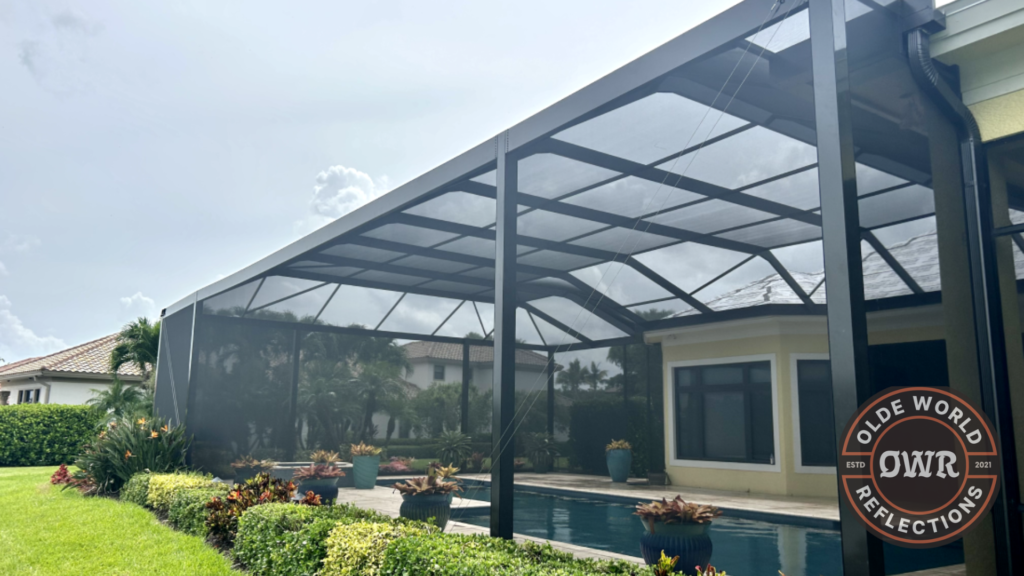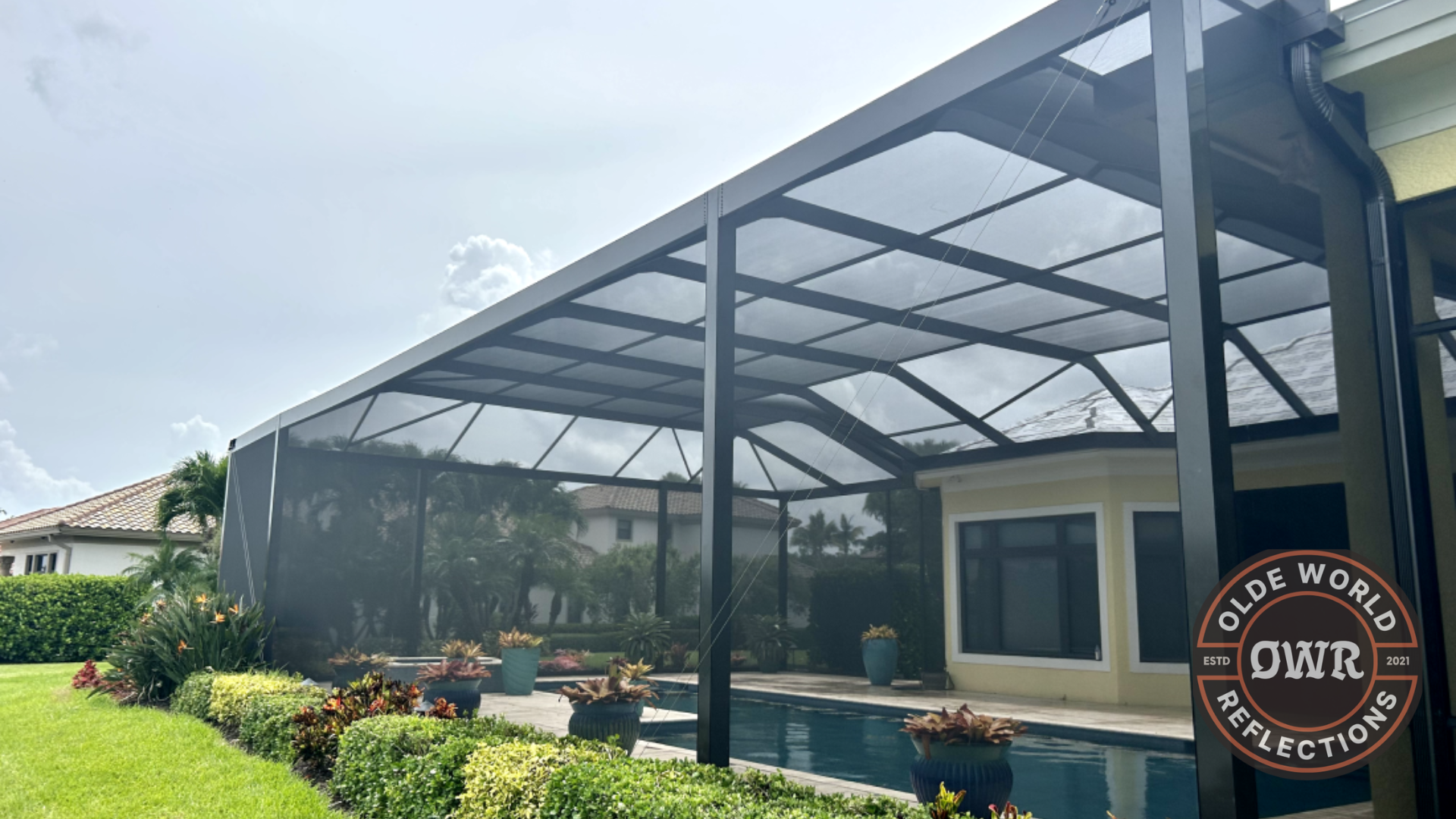How Modern Pool Enclosures Improve Energy Efficiency and Climate Control

The Overlooked Benefits of Pool Enclosures
Pool enclosures are often associated with keeping debris out and improving safety, but their impact on energy efficiency and climate control is just as significant. A well-designed enclosure can reduce energy consumption, minimize heating costs, and provide a controlled environment that enhances your swimming experience year-round.
With advances in materials and technology, today’s pool enclosures offer much more than simple protection—they actively contribute to lower energy bills and improved pool sustainability. Let’s explore how modern designs can maximize energy savings and create an eco-friendly pool environment.
How Pool Enclosures Reduce Energy Consumption
1. Minimizing Heat Loss and Retaining Warmth
One of the biggest energy costs for pool owners is heating the water, especially in cooler months. Without an enclosure, heat escapes rapidly due to evaporation and exposure to wind and cooler night temperatures.
A pool enclosure acts as a thermal barrier, trapping heat inside and significantly reducing heat loss. Enclosed pools maintain warmer temperatures for longer, which means:
- Less reliance on pool heaters to maintain comfortable water temperatures.
- Lower heating bills, especially in winter months.
- Extended swimming seasons, allowing you to enjoy the pool year-round.
2. Reducing Evaporation to Conserve Water and Energy
Evaporation is a major contributor to energy loss in swimming pools. Every time water evaporates, it takes a substantial amount of heat energy with it, forcing pool heaters to work harder. Additionally, frequent water refilling increases chemical and water consumption.
A modern pool enclosure dramatically slows the evaporation process by blocking wind and reducing exposure to direct sunlight. As a result:
- Water levels remain stable, reducing the need for constant refilling.
- Pool chemicals last longer, minimizing maintenance costs.
- Heating systems operate more efficiently, reducing overall energy use.
3. Natural Solar Heating for Cost-Effective Warmth
For those who prefer an energy-efficient approach, solar heat gain through a transparent or semi-transparent pool enclosure is an excellent benefit. High-quality enclosures made with polycarbonate or glass panels allow sunlight to pass through while trapping heat inside, naturally warming the pool.
With solar heating benefits, homeowners experience:
- Reduced dependency on electric or gas heaters.
- Lower energy costs over time.
- Consistently comfortable water temperatures without additional expenses.
Climate Control Features of Modern Pool Enclosures
1. Protecting Against Extreme Weather Conditions
Florida and other warm climates experience intense sun, heavy rain, and strong winds that can disrupt outdoor activities. A modern pool enclosure serves as a climate control system, shielding your pool from the elements.
With a high-quality pool enclosure, you gain:
- Protection from heavy rainfall, reducing overflow and contamination.
- Wind resistance, preventing rapid cooling and debris accumulation.
- UV filtration, shielding swimmers from harmful ultraviolet radiation.
2. Humidity Control for Comfort and Maintenance
Excess moisture around a pool area can lead to mold growth, structural damage, and an uncomfortable environment. Enclosures with ventilation and dehumidification features help regulate humidity levels, ensuring:
- A healthier pool environment with reduced mold and mildew.
- Less damage to nearby furniture and decking.
- A more enjoyable experience with balanced humidity levels.
3. Retractable Enclosures for Adjustable Climate Control
For homeowners who want the best of both worlds, retractable pool enclosures provide flexibility. These enclosures slide open during warm weather for fresh air and sunshine while closing during cooler months to retain heat and protect the pool.
Key advantages of retractable enclosures include:
- Year-round pool usability without major energy expenses.
- Customizable ventilation to balance airflow and humidity.
- A modern and stylish design that enhances backyard aesthetics.
Additional Benefits of Energy-Efficient Pool Enclosures
1. Lower Maintenance Costs
By blocking leaves, dirt, and insects, a pool enclosure reduces the need for constant skimming and vacuuming. Less debris means cleaner water, which decreases the frequency of filter replacements and chemical adjustments.
2. Enhanced Privacy and Security
A fully enclosed pool provides added privacy from neighbors and keeps out unauthorized visitors, making it a safer and more secluded retreat.
3. Increased Property Value
Energy-efficient, climate-controlled pool enclosures make homes more attractive to buyers, adding to resale value and market appeal.
Choosing the Right Energy-Efficient Pool Enclosure
1. Material Selection for Maximum Efficiency
When choosing a pool enclosure, material selection is critical for energy savings and climate control:
- Polycarbonate Panels: Lightweight, durable, and offers excellent insulation and UV protection.
- Glass Panels: Elegant and long-lasting, but requires additional ventilation to prevent overheating.
- Screen Mesh Enclosures: Allow airflow while blocking debris, but provide less insulation than solid panels.
2. Customizing Enclosure Features
To get the most out of your enclosure, consider these energy-saving enhancements:
- Insulated roof panels to retain heat.
- Automatic ventilation systems for humidity control.
- Tinted or UV-coated glass to regulate sunlight and prevent overheating.
3. Hiring a Professional Pool Enclosure Installer
Working with a reputable pool enclosure contractor ensures proper design, material selection, and compliance with building codes. Look for:
- Licensed and insured professionals.
- Experience with energy-efficient enclosures.
- Positive customer reviews and portfolio of previous work.
Final Thoughts: A Smart Investment for Energy Efficiency
A modern pool enclosure is more than just a protective structure—it’s an investment in energy efficiency, climate control, and cost savings. With reduced heating expenses, lower maintenance costs, and enhanced comfort, homeowners can enjoy their pools year-round while minimizing their environmental footprint.
By selecting the right materials and design, a high-quality pool enclosure will maximize energy savings, improve sustainability, and create a luxurious swimming experience for years to come.
Frequently Asked Questions (FAQs)
1. How much can a pool enclosure reduce heating costs?
A well-insulated pool enclosure can reduce heating costs by up to 50%, depending on the material and design.
2. Does a pool enclosure make the pool too hot in summer?
Some enclosures can trap excess heat, but ventilation systems, retractable roofs, and UV-resistant materials help maintain a comfortable temperature.
3. Are pool enclosures expensive to maintain?
Pool enclosures require minimal maintenance compared to uncovered pools. Regular cleaning of screens or panels ensures longevity and efficiency.
4. Can I install solar panels on a pool enclosure?
Yes, many homeowners integrate solar panels on their pool enclosures to further enhance energy savings and sustainability.
5. What is the best material for an energy-efficient pool enclosure?
Polycarbonate and insulated glass panels provide the best balance of heat retention, UV protection, and durability for energy efficiency.

